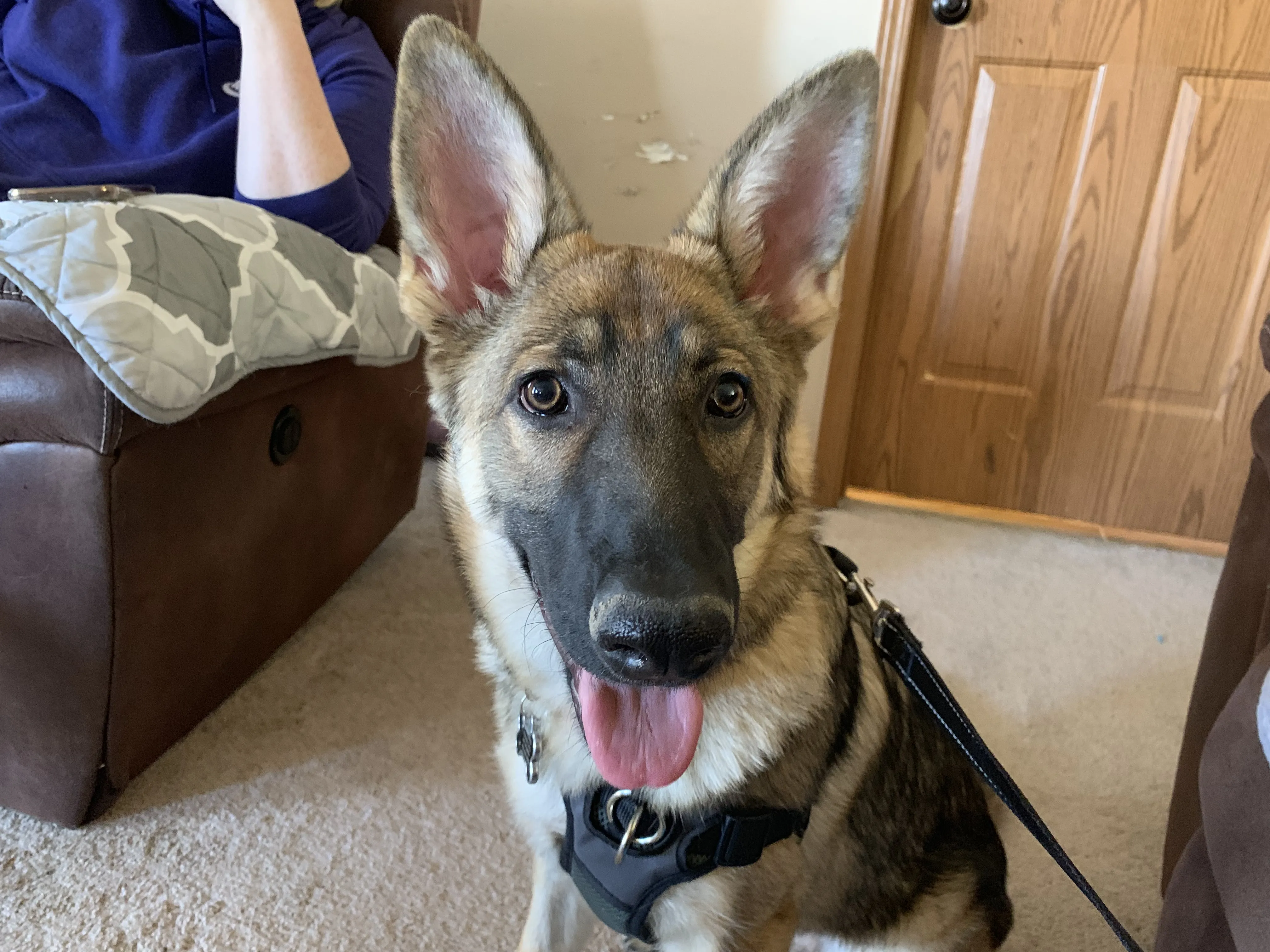Bringing a German Shepherd puppy into your home is an exciting experience. At 4 months old, these intelligent and energetic dogs are full of potential, but their behavior can also be challenging. Understanding what to expect and how to address common issues is crucial for raising a well-adjusted and happy German Shepherd.
Decoding 4-Month-Old German Shepherd Behavior
At 4 months, a German Shepherd puppy is in a critical stage of development. This is a time of rapid learning and socialization, but it can also be a period of frustrating behaviors like excessive chewing, nipping, and barking. Much of this behavior is driven by their breed characteristics and developmental stage. German Shepherds are intelligent, active dogs bred for herding and guarding. This means they need a lot of mental and physical stimulation. Without it, they can become bored and destructive.
 A playful 4-month-old German Shepherd puppy with its tongue out, looking at the camera.
A playful 4-month-old German Shepherd puppy with its tongue out, looking at the camera.
Common Behavioral Traits at 4 Months
- Excessive Chewing: Puppies explore the world with their mouths, and teething can exacerbate the need to chew.
- Nipping: Herding breeds like to nip at heels, an instinct they need to be trained out of.
- Barking: German Shepherds are naturally protective and may bark at strangers or unusual sounds.
- High Energy: They require a lot of exercises and mental stimulation.
The Importance of Socialization
A well-socialized German Shepherd is a happy and confident dog. The period between 8 and 16 weeks is crucial for exposing your puppy to a wide variety of people, places, and situations. Lack of socialization can lead to fear, anxiety, and aggression later in life.
Training Strategies for a 4-Month-Old German Shepherd Puppy
Training a 4-month-old German Shepherd requires patience, consistency, and positive reinforcement. These dogs are intelligent and eager to please, but they also have a mind of their own. Start with basic obedience commands and gradually introduce more complex tasks.
Basic Obedience Training
- Sit: Use a treat to lure the puppy into a sitting position, and say “Sit” as their rear touches the ground. Reward immediately.
- Stay: Have the puppy sit, say “Stay,” and hold your hand up. Start with short intervals and gradually increase the duration.
- Come: Use an enthusiastic tone and say “Come” while gently pulling the puppy towards you with a leash. Reward generously when they reach you.
- Down: Lure the puppy down to a lying position with a treat, saying “Down.” Reward when they are fully lying down.
Addressing Problem Behaviors
- Chewing: Provide plenty of appropriate chew toys. If the puppy starts chewing on something they shouldn’t, redirect them to a toy.
- Nipping: When the puppy nips, say “Ouch!” loudly and stop playing immediately. This teaches them that nipping results in the end of fun.
- Barking: Identify the triggers for barking. If it’s strangers, have friends and family approach the puppy calmly and offer treats.
- High Energy: Provide daily exercise, such as walks, runs, or play sessions. Puzzle toys and training sessions can also help to mentally exhaust the puppy.
Crate Training
Crate training can provide a safe and secure den for your puppy. It can also be a useful tool for housetraining and preventing destructive behavior. Introduce the crate gradually and make it a positive experience.
Socialization Techniques
Socialization is not just about exposing your puppy to new things; it’s about creating positive experiences. Here are some socialization techniques:
- People: Introduce your puppy to people of all ages, races, and genders.
- Places: Take your puppy to different places, such as parks, stores, and friends’ houses.
- Sounds: Expose your puppy to various sounds, such as traffic, sirens, and thunderstorms.
- Animals: If possible, socialize your puppy with other dogs and cats.
Tips for Successful Socialization:
- Keep it Positive: Always pair new experiences with positive reinforcement, such as treats and praise.
- Go at Their Pace: Don’t force your puppy into situations they’re uncomfortable with.
- Observe Body Language: Watch for signs of stress, such as panting, yawning, or lip licking.
- End on a High Note: Finish each socialization session with a positive experience, such as a favorite game or treat.
Nutrition and Exercise for a 4-Month-Old German Shepherd
A balanced diet and regular exercise are essential for the health and well-being of a 4-month-old German Shepherd puppy.
Nutrition
Feed your puppy a high-quality puppy food that is specifically formulated for large breeds. Follow the feeding guidelines on the food packaging and adjust the amount as needed to maintain a healthy weight.
Exercise
Provide your puppy with plenty of opportunities for exercise. This could include:
- Walks: Short, frequent walks are better than long, infrequent ones.
- Play Sessions: Play fetch, tug-of-war, or other games that get your puppy moving.
- Puzzle Toys: These toys challenge your puppy mentally and physically.
 A playful 4-month-old German Shepherd puppy with its tongue out, looking at the camera.
A playful 4-month-old German Shepherd puppy with its tongue out, looking at the camera.
Seeking Professional Help
If you’re struggling with your 4-month-old German Shepherd puppy’s behavior, don’t hesitate to seek professional help. A qualified dog trainer or behaviorist can provide guidance and support.
Conclusion
Raising a 4-month-old German Shepherd puppy can be challenging, but it’s also incredibly rewarding. By understanding their behavior, providing proper training, and socializing them early, you can set your puppy up for a lifetime of happiness and success. Remember to be patient, consistent, and always use positive reinforcement. With dedication and effort, you can develop a strong bond with your German Shepherd and enjoy their companionship for many years to come. If you are struggling with managing your dog’s behavior, consider contacting a professional dog trainer for assistance.
